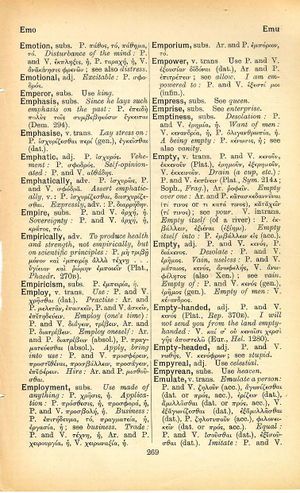emphasis: Difference between revisions
From LSJ
ῥίζα γὰρ πάντων τῶν κακῶν ἐστιν ἡ φιλαργυρία → root of all the evils is the love of money, for every possible kind of evil can be motivated by the love of money
m (Text replacement - "]]>" to "]]") |
(D_3) |
||
| Line 5: | Line 5: | ||
{{Lewis | {{Lewis | ||
|lshtext=<b>emphăsis</b>: is, f., = [[ἔμφασις]], a [[figure]] of rhet.,<br /><b>I</b> [[emphasis]], [[rhetorical]] [[stress]] (cf.: [[pondus]], [[significatio]]), Quint. 9, 2, 64; 8, 2, 11; 8, 3, 86 al. | |lshtext=<b>emphăsis</b>: is, f., = [[ἔμφασις]], a [[figure]] of rhet.,<br /><b>I</b> [[emphasis]], [[rhetorical]] [[stress]] (cf.: [[pondus]], [[significatio]]), Quint. 9, 2, 64; 8, 2, 11; 8, 3, 86 al. | ||
}} | |||
{{Gaffiot | |||
|gf=<b>emphăsis</b>, is, f. ([[ἔμφασις]]), emphase [rhét.] : Quint. 8, 2, 11. | |||
}} | }} | ||
Revision as of 06:34, 14 August 2017
English > Greek (Woodhouse)
subs.
Since he lays such emphasis on the past: P. ἐπειδὴ πολὺς τοῖς συμβεβηκόσιν ἔγκειται (Dem. 294).
Latin > English (Lewis & Short)
emphăsis: is, f., = ἔμφασις, a figure of rhet.,
I emphasis, rhetorical stress (cf.: pondus, significatio), Quint. 9, 2, 64; 8, 2, 11; 8, 3, 86 al.
Latin > French (Gaffiot 2016)
emphăsis, is, f. (ἔμφασις), emphase [rhét.] : Quint. 8, 2, 11.

